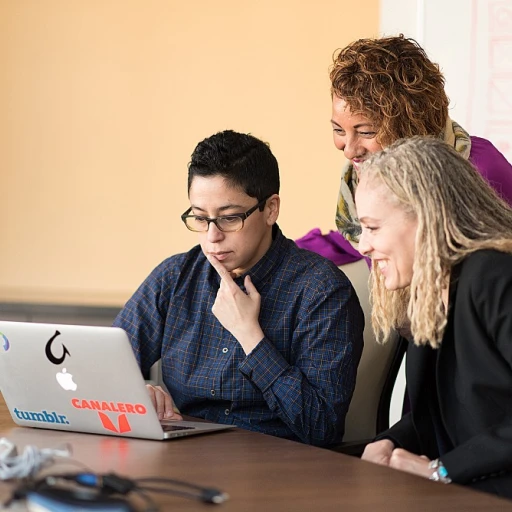
Understanding the Role of Soft Skills in Hiring
Importance of Soft Skills in the Hiring Process
In today's workplace, the ability to effectively communicate, engage in problem solving, and exhibit strong emotional intelligence has become as crucial as any hard skills credentials. Employers are increasingly looking for individuals who can contribute to a team environment, adapt to various management styles, and demonstrate effective decision making skills. This emphasis on soft skills plays a significant role in the hiring process, making it vital for employees to develop soft skills to enhance their career prospects.
During the hiring process, companies often use innovative strategies to assess the soft skill competencies of potential team members. Rather than focusing solely on technical prowess, employers seek candidates who can demonstrate active listening, communication skills, and time management. For businesses, this is more than just about filling a position; it's about ensuring the right cultural fit and promoting a collaborative work environment.
Understanding the impact of skills development through structured training, such as that offered in staff meeting settings, is important for skills employees to stay competitive. It's an ongoing process of honing and improving soft skills to meet the ever-evolving demands of the workplace. For a deeper look and specific strategies on enhancing these skills, consider exploring performance improvement plan training as a comprehensive avenue.
The Power of Staff Meetings in Skill Development
Leveraging Meetings for Skill Enhancement
Staff meetings are more than just a routine gathering; they are a powerful tool for skill development in the workplace. When conducted effectively, these meetings provide a platform for employees to enhance their soft skills, which are crucial in today's business environment. By focusing on skills training during these sessions, organizations can foster a culture of continuous learning and improvement.
Creating a Learning Environment
To maximize the potential of staff meetings, it's essential to create an environment conducive to learning. This involves encouraging open communication and active listening among team members. By promoting effective communication, employees can develop their ability to express ideas clearly and listen to others, which are key components of emotional intelligence and problem-solving.
Integrating Skill Development into Meetings
Integrating skill development into meetings requires a strategic approach. Managers can incorporate activities that focus on specific soft skills such as decision-making, time management, and feedback. For instance, role-playing scenarios can help employees practice decision-making and problem-solving in a safe setting. Additionally, providing constructive feedback during meetings can help team members improve their skills effectively.
Time Management and Structure
Effective time management is crucial for ensuring that meetings remain productive and focused on skill development. Setting a clear agenda and sticking to it helps keep discussions on track and ensures that all relevant topics are covered. This structured approach not only enhances the efficiency of meetings but also allows employees to fill any gaps in their skills training.
For more insights on how to navigate the complexities of remote work training and development, visit this resource.
Key Soft Skills to Cultivate During Meetings
Essential Interpersonal Abilities to Foster in a Collaborative Setting
Developing soft skills is crucial for the growth and efficiency of any team. Staff meetings provide an ideal platform to nurture these skills effectively. Here's a closer look at some key abilities that can be cultivated during these gatherings:- Effective Communication: Encouraging open dialogue and ensuring that all team members feel heard can significantly enhance communication skills. Meetings allow employees to practice presenting ideas clearly and responding thoughtfully.
- Active Listening: As team members contribute, honing active listening skills is vital. It involves paying full attention, understanding the message, and providing thoughtful feedback. This not only improves communication but also strengthens the team's ability to solve problems collaboratively.
- Emotional Intelligence: Understanding and managing emotions plays a huge role in workplace interactions. During meetings, encourage the ability to empathize and navigate emotions, fostering a more collaborative environment. This skill is pivotal in managing stress and maintaining effective work relationships.
- Problem-Solving & Decision-Making: Staff meetings are often convened to tackle challenges and make collective decisions. These sessions should be structured to promote critical thinking and offer employees the opportunity to apply logical reasoning and innovative solutions to real-world scenarios.
- Time Management: With finite time allocated to meetings, employees learn to prioritize discussions and manage time efficiently. This practice translates into better work management and productivity, a necessary component in the skills workplace demands.
Strategies for Effective Meeting Facilitation
Maximizing Meeting Efficiency for Skill Enhancement
To transform routine staff meetings into an influential platform for enhancing soft skills among employees, specific strategies in facilitation are pivotal. A structured approach can make a significant difference in the quality of skill development experienced by the team.
- Set Clear Objectives: Define clear objectives for each meeting. Whether it's improving communication skills or fostering better teamwork, having specific goals ensures participants know what skills they aim to develop.
- Encourage Active Participation: Facilitation should aim to involve everyone. Encouraging all team members to share their thoughts and ideas can foster an inclusive environment, allowing employees to practice their communication and active listening skills effectively.
- Implement Feedback Loops: Providing timely feedback on how team members performed during discussions can help refine their abilities, particularly in soft skills training such as emotional intelligence and decision making.
- Utilize Role-Playing Exercises: Role-playing scenarios can be an effective training tool for developing problem-solving skills and improving soft skills within a controlled, risk-free setting.
- Promote Time Management: Establish a time-bound agenda for meetings, fostering a sense of responsibility among employees and honing their time management skills, crucial in today’s fast-paced workplace.
- Facilitate Collaborative Problem Solving: Encourage groups to collaboratively tackle real business challenges. This practical application can boost their problem-solving skills and hone their ability to work as part of a cohesive team.
Incorporating these strategies can help in effectively cultivating skills among employees during meetings. By transforming these gatherings into opportunities for active learning and practical application, workplaces can ensure continuous soft skills development while simultaneously addressing their business needs.
Measuring the Impact of Meetings on Skill Growth
Measuring the Positive Outcomes of Skill-Focused Staff Meetings
To ensure that staff meetings contribute to developing soft skills among employees effectively, it’s crucial to measure their impact on skill growth. This assessment can help determine the value added to the workforce and guide future skill development strategies.- Monitor Communication Skills Progress: Track the enhancement of communication abilities within the team. Gauge whether team members are more engaged in discussions, contribute ideas more freely, and practices effective communication. Check for improved active listening skills and their ability to articulate thoughts clearly.
- Evaluate Emotional Intelligence Growth: As meetings focus on developing soft skills, observe any changes in how employees manage emotions and how they respond to others. Emotional intelligence can enhance team dynamics and conflict resolution capabilities, crucial for a harmonious workplace.
- Assess Decision-Making Skills and Problem Solving: Meetings should empower employees to enhance their decision-making abilities and problem-solving skills. Evaluate if the team actively engages in strategic planning and offers effective solutions during discussions, evident in the quality of meeting outcomes.
- Feedback and Continuous Improvement: Gather feedback from team members about the effectiveness of the meetings. Use this information to address gaps in skills development and identify areas needing improvement. Constructive feedback will offer insights into tailoring skills training to meet the specific needs of each session.
- Time Management and Efficiency: Evaluate how well team members manage their time during meetings and whether they utilize business time effectively to meet agenda goals. Effective time management indicates a well-run meeting that respects everyone's schedules and maximizes productivity.
Overcoming Challenges in Meeting-Based Skill Development
Addressing Common Obstacles in Meeting-Based Skill Enhancement
Developing soft skills through staff meetings can be a powerful approach, but it is not without its challenges. Understanding these obstacles and how to overcome them is crucial for effective skill development in the workplace.
Time Constraints and Prioritization
One of the most significant challenges is time management. Meetings often have tight schedules, and it can be difficult to allocate sufficient time for skills training. To address this, prioritize key skills that align with business goals and ensure that each meeting has a clear agenda focused on skill development. Encourage team members to engage in active listening and effective communication to maximize the use of time.
Ensuring Engagement and Participation
Another challenge is maintaining the engagement of all employees during meetings. It is essential to create an inclusive environment where everyone feels comfortable participating. Encourage feedback and foster an atmosphere of open communication. This can help in developing soft skills like emotional intelligence and problem-solving abilities.
Balancing Soft and Hard Skills
While soft skills are crucial, it is important not to overlook hard skills. Striking a balance between the two can be challenging. Integrate both types of skills into meeting agendas to ensure comprehensive skills development. This approach helps fill skill gaps and enhances the overall ability of the team.
Measuring Progress and Impact
Measuring the impact of meetings on skill growth can be difficult. Establish clear metrics and regularly assess the progress of skills development. This can involve gathering feedback from team members and evaluating their performance over time. Effective management of this process ensures that meetings contribute positively to the development of soft skills.
Overcoming Resistance to Change
Resistance to change is a common hurdle in any skills training initiative. Employees may be hesitant to embrace new methods of learning. To overcome this, highlight the benefits of developing soft skills and how they contribute to personal and professional growth. Encourage a culture of continuous learning and improvement within the team.













